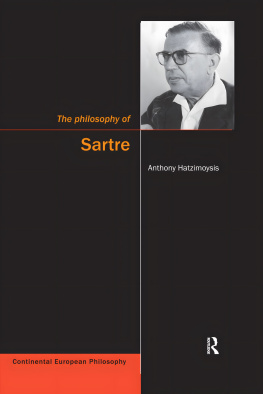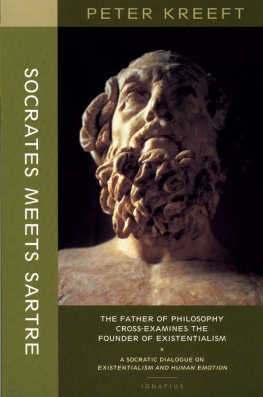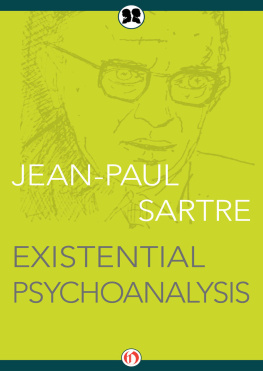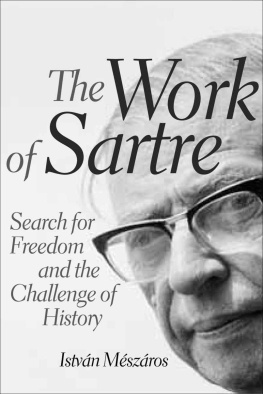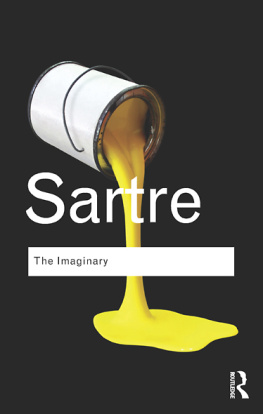Anthony Hatzimoysis - The Philosophy of Sartre
Here you can read online Anthony Hatzimoysis - The Philosophy of Sartre full text of the book (entire story) in english for free. Download pdf and epub, get meaning, cover and reviews about this ebook. year: 2014, publisher: Taylor and Francis, genre: Science. Description of the work, (preface) as well as reviews are available. Best literature library LitArk.com created for fans of good reading and offers a wide selection of genres:
Romance novel
Science fiction
Adventure
Detective
Science
History
Home and family
Prose
Art
Politics
Computer
Non-fiction
Religion
Business
Children
Humor
Choose a favorite category and find really read worthwhile books. Enjoy immersion in the world of imagination, feel the emotions of the characters or learn something new for yourself, make an fascinating discovery.
- Book:The Philosophy of Sartre
- Author:
- Publisher:Taylor and Francis
- Genre:
- Year:2014
- Rating:4 / 5
- Favourites:Add to favourites
- Your mark:
- 80
- 1
- 2
- 3
- 4
- 5
The Philosophy of Sartre: summary, description and annotation
We offer to read an annotation, description, summary or preface (depends on what the author of the book "The Philosophy of Sartre" wrote himself). If you haven't found the necessary information about the book — write in the comments, we will try to find it.
The Philosophy of Sartre — read online for free the complete book (whole text) full work
Below is the text of the book, divided by pages. System saving the place of the last page read, allows you to conveniently read the book "The Philosophy of Sartre" online for free, without having to search again every time where you left off. Put a bookmark, and you can go to the page where you finished reading at any time.
Font size:
Interval:
Bookmark:

This series provides accessible and stimulating introductions to the ideas of continental thinkers who have shaped the fundamentals of European philosophical thought. Powerful and radical, the ideas of these philosophers have often been contested, but they remain key to understanding current philosophical thinking as well as the current direction of disciplines such as political science, literary theory, social theory, art history, and cultural studies. Each book seeks to combine clarity with depth, introducing fresh insights and wider perspectives while also providing a comprehensive survey of each thinkers philosophical ideas.
The Philosophy of Agamben
Catherine Mills
The Philosophy of Derrida
Mark Dooley and Liam Kavanagh
The Philosophy of Foucault
Todd May
The Philosophy of Gadamer
Jean Grondin
The Philosophy of Habermas
Andrew Edgar
The Philosophy of Heidegger
Michael Watts
The Philosophy of Hegel
Allen Speight
The Philosophy of Husserl
Burt C. Hopkins
The Philosophy of Kierkegaard
George Pattison
The Philosophy of Merleau-Ponty
Eric Matthews
The Philosophy of Nietzsche
Rex Welshon
The Philosophy of Sartre
Anthony Hatzimoysis
The Philosophy of Schopenhauer
Dale Jacquette
Anthony Hatzimoysis

First Published 2011 by Acumen
Published 2014 by Routledge
2 Park Square, Milton Park, Abingdon, Oxon OX14 4RN
605 Third Avenue, New York, NY 10017, USA
Routledge is an imprint of the Taylor and Francis Group, an informa business
Anthony Hatzimoysis, 2011
This book is copyright under the Berne Convention.
No reproduction without permission.
All rights reserved. No part of this book may be reprinted or reproduced or utilised in any form or by any electronic, mechanical, or other means, now known or hereafter invented, including photocopying and recording, or in any information storage or retrieval system, without permission in writing from the publishers.
Notices
Practitioners and researchers must always rely on their own experience and knowledge in evaluating and using any information, methods, compounds, or experiments described herein. In using such information or methods they should be mindful of their own safety and the safety of others, including parties for whom they have a professional responsibility.
To the fullest extent of the law, neither the Publisher nor the authors, contributors, or editors, assume any liability for any injury and/or damage to persons or property as a matter of products liability, negligence or otherwise, or from any use or operation of any methods, products, instructions, or ideas contained in the material herein.
ISBN: 978-1-84465-046-0 (hardcover)
ISBN: 978-1-84465-047-7 (paperback)
DOI: 10.4324/9781315712123
British Library Cataloguing-in-Publication Data
A catalogue record for this book is available from the British Library.
Typeset in Classical Garamond.
For Eva
Jean-Paul Sartre is one of the most famous philosophers of recent times; he is also one of the most difficult. His fame owes much to his political and emotional engagements, as well as to the wealth of ideas expressed in his novels, plays, journals and critical essays. The difficulties arise as soon as we ask about the reasons for endorsing those ideas. In order to achieve a proper understanding of his views, and the reasons that might support them, we need to look at that part of Sartres work where he explicitly addresses their content, presuppositions and implications; in other words, we need to explore his philosophy.
The philosophical writings of Sartre span fifty years. During that period, Sartre articulated, developed and elaborated, in sometimes unpredictable ways, a number of seminal arguments on major topics of philosophical enquiry. The desire for securing a reliable compass through the sea of Sartrean volumes, diaries and still unpublished manuscripts might make one adopt a sideways approach to Sartres philosophy. We might wish to introduce his philosophy by categorizing his work under fixed headings, such as existentialism, socialism or phenomenology. This is a justifiable way to proceed if we already know what those terms mean, and how they should apply to each Sartrean text that is taken to express those schools of thought. Another approach may introduce Sartres trajectory as filling the intellectual gap between, say, certain Austrian and German philosophers, on the one hand, and certain French or American philosophers, on the other. Such an approach might be correct in some respects, but it remains distinctively unhelpful for anyone with insufficient grasp of the work of the philosophers under consideration.
For the purposes of this book, I have taken the rather less travelled path of introducing Sartres thought by focusing just on specific parts of Sartres own work. Some references to other philosophers are of course inescapable especially for those who wish to enquire into the context of Sartres work.
A valuable source of feedback on my work on Sartre comes from teaching, for nearly a decade now, upper-year undergraduate and postgraduate students, who make up the kind of audience to which the present book is primarily addressed. It is not uncommon for students who are acquainted with Sartre through textbook paraphrases of some of his most popular claims, to experience serious puzzlement when they turn to the original texts expecting to see a fixed set of existentialist slogans popping up on every page. What they find instead is a philosopher working in meticulous detail on some fundamental problems in metaphysics, epistemology, the philosophy of value, meaning, mind and action. Moreover, the Sartrean approach to practical issues is hard to justify or, even, to interpret correctly, if it is not seen from within the Sartrean perspective of reality in general. I have accordingly focused on certain themes whose discussion might help introduce the reader to the Sartrean way of thinking about reality. The themes of intentionality, perception, emotion, imagination, being, existence and essence are also topics of concern to contemporary philosophical enquiry. I have thus tried to articulate how the Sartrean approach may advance our understanding of the current debates surrounding those issues. My reasoning, to be sure, is not that these are the only issues worth exploring in Sartres voluminous output; it is rather that an exploration of several other topics presupposes or, at least, can most securely proceed on the back of a good grasp of the issues addressed in the present work.
One of the nice things about completing a manuscript is the opportunity it affords the author to acknowledge the help he received, mostly in the form of incisive remarks from several colleagues. I am first of all grateful to audiences in London, Oxford, Paris and St Petersburg, where some of the ideas presented in the book had their first airing. I should also thank Chris Daly, Peter Goldie, Harry Lesser and David Liggins for commenting astutely on parts of the manuscript.
Next pageFont size:
Interval:
Bookmark:
Similar books «The Philosophy of Sartre»
Look at similar books to The Philosophy of Sartre. We have selected literature similar in name and meaning in the hope of providing readers with more options to find new, interesting, not yet read works.
Discussion, reviews of the book The Philosophy of Sartre and just readers' own opinions. Leave your comments, write what you think about the work, its meaning or the main characters. Specify what exactly you liked and what you didn't like, and why you think so.

